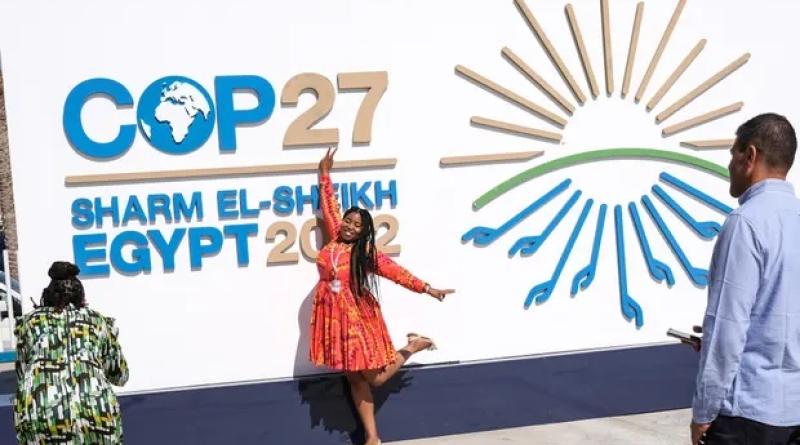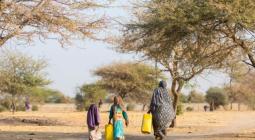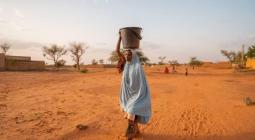Cop27 first week roundup: powerful dispatches, muted protest, little cash

Despite ‘loss and damage’ focus there have been more oil and gas lobbyists than delegates from the most vulnerable countries
Humanity is on a highway to hell, with our foot on the accelerator. The message from the UN secretary general to more than 110 world leaders at the Cop27 UN climate summit in Egypt could not have been clearer: change course now, or face “collective suicide”.
Greenhouse gas emissions have continued to rise this year, research published this week has shown, despite stark warnings from climate scientists in the past year. The prospects of sticking to the 1.5C limit above pre-industrial levels that scientists tell us is necessary have receded to a “narrow window”.
Many of the heads of state and government gathered in Egypt for the first days of the UN Cop27 climate summit, where 45,000 people from 196 countries are halfway through their two weeks of talks on the climate crisis, had their own dispatches to add from the frontline of the global emergency.
That from Pakistan’s prime minister, Shehbaz Sharif, was among the most powerful. “The catastrophic floods impacted 33 million people, more than half our women and children, [covering] the size of three European countries. Despite seven times the average of extreme rain in the south, we struggled on as raging torrents ripped out over 8,000km of metal roads, damaged more than 3,000km of railway track and washed away standing crops on 4m acres and ravaged all of the four corners of Pakistan,” he told a hall shocked into silence.
“We became a victim of something with which we had nothing to do, and of course it was a manmade disaster,” he said. “Imagine on one hand we have to cater for food security for the common man by spending billions of dollars and on the other we have to spend billions of dollars to protect flood-affected people from further miseries and difficulties. How on earth can one expect from us that we will undertake this gigantic task on our own?”
Protest has been muted at Cop27, where activists have sought to put Egypt’s dismal record on human rights under the spotlight. Greta Thunberg, the Swedish youth activist, decided not to come, and many activists are confined to a separate location from the main conference.
Delegates at the conference also faced a lack of food and water, and a spill of what appeared to be raw sewage at the conference centre. Egyptian security has been out in force, and events for civil society groups have been curtailed.
That has not stopped all protest at the Cop, however – and the demands from those protesting centre on one issue: “loss and damage”. The term refers to the devastating impacts of the climate crisis, the most severe extreme weather that countries cannot adapt to, or protect themselves against. Pakistan’s record floods are one example; the severe drought that has left 150 million people in Africa threatened by extreme hunger is another.
Poor countries argue that the rich, source of most greenhouse gas emissions, must provide assistance to the poor that are most afflicted. “Loss and damage is not charity – it’s climate justice,” Nabeel Munir, Pakistan’s climate envoy, said.
The amount of cash needed for climate finance, including loss and damage, can seem daunting. In a report jointly commissioned by the UK, host of last year’s Cop26 summit, and the Egyptian hosts of Cop27, published on Tuesday, the climate economist Lord Stern calculated that about $2tn a year would be needed by 2030 for the entire developing world, except China.
However, that amount is not substantially more than what would be needed to invest in those economies in any case, using fossil fuels.
Despite the focus on loss and damage, there has been little cash forthcoming at this conference so far. The UK said it would allow some debt payment deferrals for countries hit by climate disasters, while Austria and New Zealand put forward funding for loss and damage, and John Kerry, the US special presidential envoy for climate, unveiled a plan to use carbon offsetting to raise cash.
Even as young people protested, and those facing the most severe impacts of the climate crisis bore witness, the halls of Cop27 were host to a shady group with quite different intentions. Oil and gas companies are enjoying an unprecedented bonanza amid record fossil fuel prices, sent soaring by Russia’s invasion of Ukraine. They have sent lobbyists to Cop27 in force – there are more than 600 of them enjoying access to the talks, according to analysis by Global Witness published on Thursday. That is more than the delegations of many of the most vulnerable countries combined.
Africa is particularly in their sights. This is the first African Cop in six years, and some African leaders have come with a specific purpose: to gain backing to exploit their gas reserves. Macky Sall, the president of Senegal, asked in an interview: “Why not? Why should Africa not do this?”
Climate campaigners are distraught at the prospect, warning of a “neocolonial” gas grab that would benefit only the gas multinationals and the country elites, while poor people would suffer even worse consequences from global heating.
But western countries are wary of appearing hypocritical in urging African countries not to exploit their gas, and besides, many European countries especially want to import African gas to ease their own cost of living crisis.
Negotiations at Cop27 will carry on for the next week, and countries are hoping for substantial progress on loss and damage, and climate finance more generally. But there will be no final settlement of loss and damage here. The most that can be hoped for is to set out a framework and parameters for how a loss and damage funding facility could be achieved, with a deadline on when it should be in operation.
At Cops, sometimes the most telling outcome is one that is not even on the agenda. That could well be the case for Cop27, in the form of a drastic overhaul of the world’s public financial institutions.
The World Bank and other multilateral development banks, along with the International Monetary Fund and the World Trade Organization, were created at the Bretton Woods conference, in the final days of the second world war. They were intended to foster international economic cooperation, dispense aid to countries that need it, and oil the wheels of public finances.
But the world has changed since 1944, as Mia Mottley, the prime minister of Barbados, pointed out. “Institutions crafted in the mid-20th century cannot be effective in the third decade of the 21st century,” she said. “They do not describe 21st-century issues. Climate justice was not an issue then [when the bank was set up].”
The World Bank has come under increasing fire at Cop27 from countries that believe it is failing on climate finance. They argue the overall spending is too low, too much of it is in the form of loans rather than grants, and too much is directed towards middle-income countries rather than the poorest.
Spokespeople for the World Bank point out it provided $31.7bn of project financing for the climate in 2022.
The World Bank is a separate institution to the UN, and there is no mandate for the UN framework convention on climate change – the treaty under which the conference of the parties (Cop) takes place – to make changes to it. So no formal intervention to overhaul the bank can be made at this summit.
But it has become increasingly clear at Cop27 that the current setup of the World Bank is a severe brake to progress on climate finance. If reform does eventually happen, which is looking increasingly likely, it might be the biggest achievement from Sharm el-Sheikh.
COVER PHOTO: A woman poses in front of the congress centre staging Cop27 at the end of the first week of the summit in Sharm el-Sheikh. Photograph: Sedat Suna/EPA





